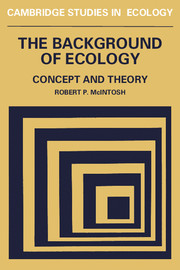Book contents
- Frontmatter
- Contents
- Preface
- Acknowledgments
- 1 Antecedents of ecology
- 2 The crystallization of ecology
- 3 Dynamic ecology
- 4 Quantitative community ecology
- 5 Population ecology
- 6 Ecosystem ecology, systems ecology, and big biology
- 7 Theoretical approaches to ecology
- 8 Ecology and environment
- References
- Name index
- Subject index
8 - Ecology and environment
Published online by Cambridge University Press: 05 August 2012
- Frontmatter
- Contents
- Preface
- Acknowledgments
- 1 Antecedents of ecology
- 2 The crystallization of ecology
- 3 Dynamic ecology
- 4 Quantitative community ecology
- 5 Population ecology
- 6 Ecosystem ecology, systems ecology, and big biology
- 7 Theoretical approaches to ecology
- 8 Ecology and environment
- References
- Name index
- Subject index
Summary
All definitions of ecology agree that it has to do with the interrelationships of organisms and environment. The organism of greatest concern is Homo sapiens. Glacken (1967) commented that every thinker from the 5th century B.C. to the end of the 18th century A.D. had something to say about the earthly environment and humans' relation to it. There has been no letup in the 19th and 20th centuries. Indeed, concern with the environment, or broadly speaking nature, became central to human concerns (Ekirch 1963; Nash 1967; Passmore 1974; Sheail 1976). Ekirch (1963:1) wrote, “Man and nature is the basic fundamental fact of history.” Although the concept of nature has a long history and many diverse interpretations (Hepburn 1967; Kormondy 1974, 1978; Hausman 1975), the antithesis implied in Ekirch's phrase is characteristic of most traditional Western environmental thought. Nature is commonly thought of as that part of the physical world other than humanity and its constructions, and natural commonly implies phenomena taking place without human involvement. Some, like Kormondy, question the distinction but retain it as useful. Passmore wished he could avoid the word nature, describing it as “ambiguous” but also “indispensable.” In familiar usage, nature is “man's” environment and clearly has shaped “his” biological and cultural history. Stilgoe (1982) contrasted the landscape as the environment created by humans with wilderness as a threatening, evil area beyond human control, a contrast to the romantic view of wilderness.
- Type
- Chapter
- Information
- The Background of EcologyConcept and Theory, pp. 289 - 323Publisher: Cambridge University PressPrint publication year: 1985

